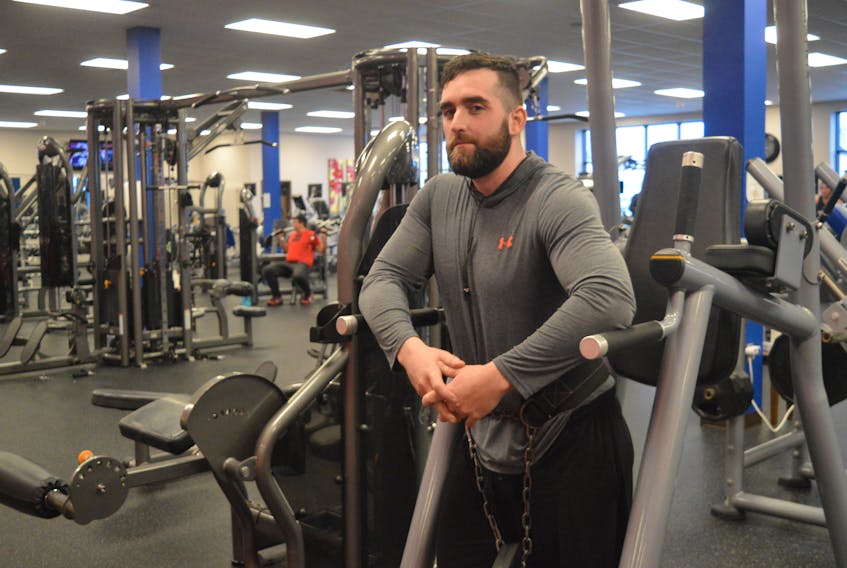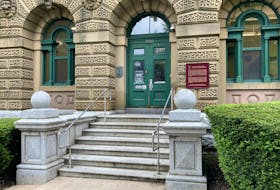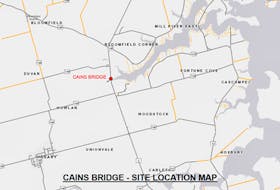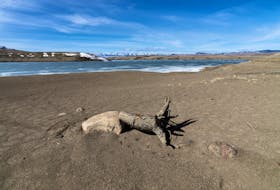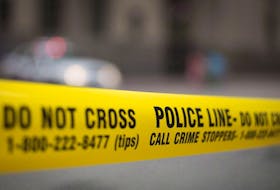GLACE BAY, N.S. — The 26-year-old Glace Bay man felt like he was watching a movie as he glanced around the operating room before his brain surgery.
“I was lying on the operating table, looking around at all these people, the doctors and everything. I was thinking, ‘wow, all these people are here to help me,’” said Dylan Yates, sitting in his “second home,” Platinum Fitness in Glace Bay.
“Then it was the weirdest thing. My doctor walked by me and I was just about to go to sleep when he looked at me and smiled. It is something I will never forget. I kind of knew everything was going to be OK.”
Doctors were removing a tumour from the medulla, part of Yates’ brain stem. It was one of 14 tumours found in January when Yates was diagnosed with Von Hippel-Lindau (VHL), a genetic condition involving abnormal growth of blood vessels.
Doctors also found renal cell carcinoma, an incurable kidney cancer some people with VHL get.
Because of the condition, tumours grow on 10 different parts of the body, including the kidneys, eyes and spine. Because there is no cure, the tumours will always grow. The only treatment is to remove them, but there are risks.
Removing a kidney tumour means a piece of kidney goes with it. Tumours on the brain form in areas responsible for important functions, like speech or sight, so removing them could affect these vital areas.
“Instead of using this to bring me down I used it to push me forward, to motivate me to be a better person and to do better things in this world,” Yates said.
“You only have one life. I realize that now. In one day your life can change forever so it’s important to follow your passions, your dreams and just be happy with your life. No matter what your situation is.”
Yates was finishing his natural resources environment technology diploma at Nova Scotia Community College in Port Hawkesbury when he was diagnosed. It was a program he worked hard to get into.
“It was kind of like a slap in the face saying, yeah you’re doing everything right, you’re back in school trying to get your life on track then all of a sudden, bam! Life hits you with this,” Yates admitted.
Determined to not give up, Yates scheduled his first kidney surgery during March break so he wouldn’t miss school.
He graduated with honours and then had his brain surgery done. But there was complications.
The patch put on his brain to stop fluid leak fell off. Doctors in Halifax replaced it but then it got infected and Yates contracted meningitis on the brain.
All of July he was in hospital, receiving antibiotics intravenously, four hours a day. When he was released, Yates was fitted with a pump to continue treatment that way.
Through all of this, he continued to organize cleanups of garbage illegally dumped around the Cape Breton Regional Municipality with the Cape Breton Environmental Conservation group he founded in June.
“I always say you can’t always control what happens to you but you can control how you react to it. That’s something I kind of live by now,” Yates said.
“When something like this happens to you, it kind of gives you a new lease on life. You kind of appreciate life more.”
Since starting, the group had cleaned up nine sites, collecting 323 bags of garbage. The most recent cleanup was Morrison Beach on Dec. 18 where they collected 80 bags of garbage.
“It’s been a rough go but it’s been a good go, too. It’s not all bad,” Yates said about life since diagnosis.
He doesn’t want people to feel sorry for him because he doesn’t. Instead, he wants to inspire people, encourage environmental conservation and keep healthy.
“I can’t stop them (the tumours) from growing but I can keep my body strong for the surgeries and the recovery, right?” said Yates, who currently has tumours on his left eye, cerebellum and kidneys.
“If I stay at home and I eat junk food all day and become overweight, that’s not going to help me. I tried to stay active and healthy and do my part so the doctors can do theirs.”
BIO BOX
Name: Dylan Yates
Birthday: March 6, 1991.
High School: Glace Bay High.
College: NSCC Port Hawkesbury, grad June 2017.
University: CBU, starting Jan. 2018.
Career Goals: Anything in environmental engineering field.
Favourite activities: Being outdoors.
Family: one brother, one sister.
Thing people don’t usually know: He has health problems. “My doctor tells me I hide it well.”
Von Hippel-Lindau (VHL)
What: A genetic condition involving abnormal growth of blood vessels.
Why: Flaw in the VHL gene.
How: 80 per cent of cases passed from a parent, 20 per cent result of new mutation in reproductive cells/early development.
Average age: Diagnosis 32, first symptoms 23.
How many: 1 – 36,000 people have it, worldwide.
More info: www.vhl.org .
RELATED READING

